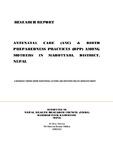Please use this identifier to cite or link to this item:
https://hdl.handle.net/20.500.14356/299| Title: | Antenatal Care (ANC) and Birth Preparedness Practices (BPP) among Mothers in Mahottari District, Nepal |
| Authors: | Sharma, Rosy Mishra, Shravan Kumar |
| Issue Date: | 25-Aug-2011 |
| Keywords: | Antenatal Care Birth Preparedness Practices (BPP) |
| Abstract: | Antenatal care is the care of the women soon after conception and throughout pregnancy. The primary aim is to achieve at the end of the pregnancy a healthy mother and child. Prevention and promotion of maternal health detection and management of associated diseases, early recognition and management of complications are main ANC’s components. It is suggested to have minimum four antenatal visits for each pregnant woman together with a regular and adequate tetanus toxoid immunization, diet, and rest and iron supplementation. The ANC quality services are assessed on basis of the type of provider, the number of ANC visit, and the timing of the ANC first visit, content of services received and the kind of information given during the visit. Maternal mortality remains one of the biggest public health problems in Nepal. Lack of access to basic maternal healthcare, difficult geographical terrain, poorly developed transportation and communication systems, poverty, illiteracy, women's low status in the society, political conflict, and shortage of health care professional and under utilization of currently available services are major challenges to improving maternal health in Nepal. In order to effect real improvements in maternal health, attention needs to be focused both on biomedical and social interventions. Improving health facilities, mother’s nutrition, women’s position in the society such as freedom of movement, providing education to female children, integrating Traditional Birth Attendants (TBA) into local health services can play a vital role in the improvement of mothers’ health. Maternal mortality is one of the key indicators of the status of reproductive health care service delivery and utilization, but it also can be an indicator of women’s status in a society. A cross-sectional descriptive study was carried out to assess knowledge and practices on Antenatal Care among mothers of Mahottari district. 400 mothers with a 3 year child and expecting mothers were interviewed for the required information with the structured interview. More than two third of mothers were illiterate. The source of income was agriculture followed by foreign labourer. More than three fourth of mothers had to take permission from family head .Decision maker in the family was father in law and husband. Less than fifty percent of the mothers had visited four times. Reason for not visiting four times were the lack of awareness in more than two third followed by permission not granted by family head, economical problem. Most of mothers had knowledge of danger signs during pregnancy. In case of danger signs, two third of the mothers took to hospital followed by taking rest and some had no idea what to do during danger signs. Most of the mothers had made preparation for child birth during pregnancy. Three-fourth of the mothers had preferred for health post and hospital and rest at home for baby delivery. The education in mothers, level of health awareness in the community, involvement in decision making, economical condition, health service compliance were some issue to improve ANC visit and BPP (Birth preparedness practices) and finally to reduce maternal and child mortality. Thus, the reports were submitted to NHRC with appropriate recommendations to the concerned authority on the basis of conclusions of the study. |
| URI: | http://103.69.126.140:8080/handle/20.500.14356/299 |
| Appears in Collections: | Post Graduate Grant (PG) Reports |
Items in DSpace are protected by copyright, with all rights reserved, unless otherwise indicated.

